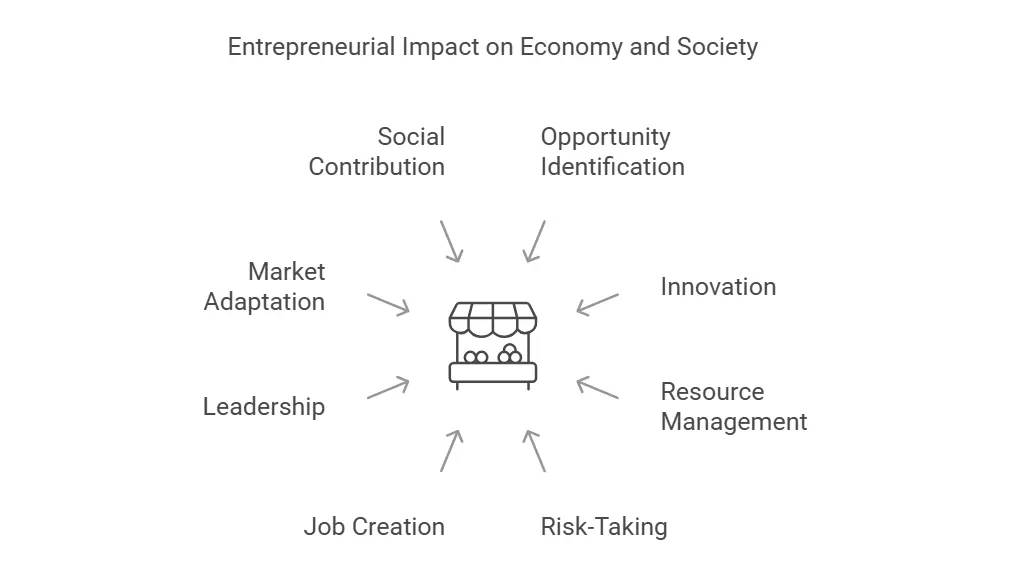Entrepreneurs are often seen as the backbone of any economy. They play a pivotal role in creating jobs, fostering innovation, and driving economic growth. In India, the entrepreneurial spirit is woven into the fabric of everyday life, from the street vendors setting up their stalls each morning to tech founders scaling global businesses from their garages. The role of an entrepreneur extends far beyond merely starting a business—it involves identifying opportunities, managing resources, making decisions, and much more. In this article, we will explore the multifaceted role of an entrepreneur, using relatable examples from the Indian context and household analogies.

Opportunity Identification and Idea Generation
At the heart of entrepreneurship is the ability to identify opportunities and generate innovative ideas. Entrepreneurs are constantly on the lookout for gaps in the market where they can introduce new products, services, or solutions. They observe trends, listen to customer needs, and often find ways to address problems that others may overlook.
Example
Think of Ritesh Agarwal, founder of OYO Rooms, who saw the disorganized and often unaffordable state of budget hotels in India. He identified the opportunity to standardize and improve these small hotels, offering affordable, quality accommodations across the country. His ability to spot this gap and create a scalable business model revolutionized the Indian hospitality industry.
Household Analogy
Imagine a homemaker who notices that her neighbors struggle to find fresh homemade snacks. She recognizes the opportunity and starts a small business making traditional namkeen and sweets, catering to this need. Just like this homemaker, an entrepreneur identifies unmet demands and seizes the opportunity to offer solutions.
Innovation and Problem-Solving
Entrepreneurs are often innovators at heart. They look for ways to solve problems creatively, whether it’s through a new product, service, or business model. Innovation is not limited to technology—it can be about finding more efficient ways of delivering a service or improving customer experience.
Example
Byju Raveendran, founder of Byju’s, solved the problem of accessible, high-quality education in India by creating an engaging, interactive learning platform. His innovation was to use digital content to teach complex subjects, making learning fun and accessible to millions of students across the country.
Household Analogy
Think of how in an Indian household, a pressure cooker was once considered an innovation that revolutionized cooking. It solved the problem of time-consuming food preparation and saved fuel, making life easier for homemakers. Similarly, entrepreneurs bring innovations that make processes simpler and more efficient for their customers.
Resource Mobilization and Management
One of the most crucial roles of an entrepreneur is mobilizing and managing resources effectively. This includes securing capital, hiring talent, acquiring raw materials, and utilizing technology. Entrepreneurs must ensure that the resources they gather are used efficiently to maximize productivity and profitability.
Example
Dhirubhai Ambani, founder of Reliance Industries, was a master at resource mobilization. Starting with minimal capital, he built one of India’s largest conglomerates by carefully managing relationships with suppliers, employees, and investors. His ability to mobilize and manage resources was key to Reliance’s success.
Household Analogy
In Indian households, when planning a wedding or family event, resource management is essential. From budgeting for catering to organizing transportation and accommodation, everything must be meticulously planned to ensure a smooth function. Similarly, an entrepreneur must efficiently manage financial, human, and material resources for the success of their business.
Risk-Taking and Decision-Making
Entrepreneurs are risk-takers by nature. They must make critical decisions, often in uncertain environments, while balancing risks and rewards. Every business venture involves some level of risk—whether it’s investing in a new product, entering a new market, or scaling operations. The entrepreneur’s ability to take calculated risks and make sound decisions can determine the success or failure of their business.
Example
Mukesh Ambani’s decision to invest heavily in Reliance Jio was a significant risk. He entered a highly competitive telecom market dominated by established players. However, his bold decision to offer affordable data plans and free voice calls paid off, transforming India’s digital landscape and making Jio a household name.
Household Analogy
Consider a family deciding to buy a second-hand car to start a taxi service. They assess the risks—maintenance costs, competition, and potential profits—before making the decision. In the same way, entrepreneurs must weigh the risks before making strategic business decisions.
Job Creation and Economic Growth
One of the most significant roles of an entrepreneur is job creation. By starting and growing businesses, entrepreneurs provide employment opportunities, directly contributing to economic growth. In India, where job creation is critical for a growing population, entrepreneurs play a vital role in sustaining livelihoods and improving living standards.
Example
Kiran Mazumdar-Shaw, the founder of Biocon, not only built a successful biopharmaceutical company but also created thousands of jobs in research, manufacturing, and sales. Entrepreneurs like her contribute to economic development by generating employment and creating wealth in the economy.
Household Analogy
Just like how a family-run business, such as a small tailoring shop, provides employment to local artisans and support staff, entrepreneurs contribute to their community by creating jobs and providing income to many families. This is especially important in a country like India, where entrepreneurship often fuels local economies.
Leadership and Motivation
Entrepreneurs are leaders who inspire and guide their teams. They set the vision for the company and motivate employees to work toward achieving common goals. A successful entrepreneur must be able to create a positive work culture, foster innovation, and help employees realize their potential.
Example
Indra Nooyi, former CEO of PepsiCo, is known for her exceptional leadership qualities. During her tenure, she not only grew the company’s revenues but also motivated her employees to focus on sustainability and social responsibility, inspiring them to contribute to the company’s long-term vision.
Household Analogy
In Indian households, we often see one person taking the lead during family events or functions, ensuring that everyone is on the same page and working harmoniously. Similarly, entrepreneurs must lead by example, fostering collaboration and motivation within their teams to achieve success.
Adaptation to Market Changes
In a fast-paced world, entrepreneurs must remain adaptable. Markets change, consumer preferences evolve, and technology advances rapidly. Entrepreneurs need to be flexible, ready to pivot their business strategies when necessary, and continuously innovate to stay relevant.
Example
Deepinder Goyal, co-founder of Zomato, had to pivot from a restaurant discovery platform to food delivery when market demand shifted. This adaptability helped Zomato not only survive but thrive in a competitive environment where consumer behavior was evolving rapidly toward online food delivery.
Household Analogy
In an Indian household, think of how meal planning often changes based on seasonal availability of vegetables or shifting family preferences. Just as a homemaker adapts to these changes, entrepreneurs must also be quick to respond to market shifts and customer needs.
Contributing to Social Welfare
Beyond profit-making, many entrepreneurs focus on creating a positive social impact. Social entrepreneurship is a growing trend, where business ventures are designed not just to generate profit but also to solve social or environmental issues. Entrepreneurs in India, particularly in the rural sector, often play an important role in improving community welfare.
Example
Anshu Gupta, founder of Goonj, turned urban waste into a valuable resource for rural communities. His business model addresses both urban waste management and rural development, exemplifying how entrepreneurs can create businesses that benefit society while being financially sustainable.
Household Analogy
Much like a homemaker who volunteers time or resources for community events, social entrepreneurs devote their efforts to bettering society. They focus on solving real-world issues, such as poverty, education, or sustainability, through their business models.
For More Content Check Out :- KMBN 302
Conclusion
The role of an entrepreneur is multifaceted and crucial to the progress of any economy. Entrepreneurs are innovators, risk-takers, leaders, and job creators. They not only drive economic growth but also contribute to solving societal challenges. In the Indian context, where entrepreneurship ranges from small family businesses to large corporations, the entrepreneurial spirit is a key driver of progress and change.
Whether it’s the local chaiwala expanding his business or a tech entrepreneur building the next big startup, the role of an entrepreneur is vital in shaping the future. Like managing a household, entrepreneurship requires a mix of creativity, adaptability, leadership, and hard work. By embracing these roles, entrepreneurs can build successful ventures that not only prosper financially but also positively impact society.
